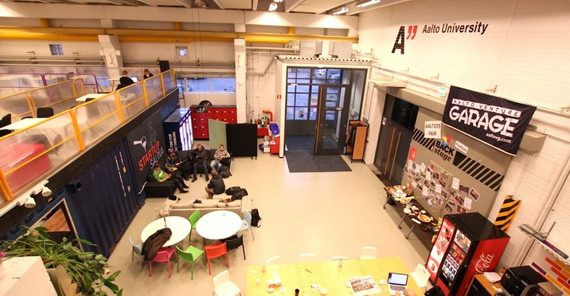Today we are travelling to Aalto University in Otaniemi, which was founded in 2010. It was established by merging the Helsinki School of Economics, Helsinki University of Technology, and the University of Art and Design Helsinki. Combining these three very different units has created a place of outstanding creativity and diverse innovation within a very short time.
We are having an appointment with Mika Pirttivaara, Elina Wanne, and Joonas Ahlava of the Rapid Action Group (RAG). They meet us in the canteen of the Alto University Management. The place is not only popular with university students and staff but also with externals who meet here to exchange ideas and have discussions. Mika, Elina, and Joonas do not work or study at the university, but their network extends into the university’s institutions, which they want to use to meet social challenges and stimulate economic and scientific growth. They call Rapid Action Group the first parliament startup because the 24 founding partners also include members of the Parliament of Finland who share the same values and want to take part in promoting social and economic innovations.
After a long conversation we have a tour of the campus. Our first stop is already an impressive example that you have to accept risks in order to reap the fruit of your boldness. The present building of the Design Factory has always been the university’s property. However, it had stood empty for a while until the founding director and some students squatted it spontaneously. After refurbishing and retrofitting the building, it has been providing a unique academic environment in Europe for learning and working since its official opening in 2008. Seminar and presentation rooms as well as workshops and laboratories are available for different use. They are open to all members of the university, partner companies, and innovation projects.
Right next door, the university made the first move and put the building at the disposal of the student initiative Aaltoes (Aalto Entrepreneurship) in 2009. The place that is known under the name Startup Sauna enjoys an international reputation in the startup scene today. Startup Sauna remains a mere student initiative although a versatile and comprehensive structure has been established, which boasts a large shared working space for aspiring entrepreneurs both coming from inside and outside the university, a very successful accelerator program for startups and also activities that have outgrown the university environment, e.g. the exchange program Startup Life and the conference SLUSH. It is a non-profit organization and operates the start-up center. Supported by volunteers, it offers over 100 events around the topic entrepreneurship every year. Teemu Laiho, Treasurer of Aaltoes, who takes us around Startup Sauna, sums it up, “The university let us do what we want as long as we do not break or destroy things. We do not need more support than this.”
After a short detour to Urban Mill that is a co-working and co-creation platform prototype for urban innovation and promotes interaction between public administration, private business and the university, Mika takes us to the EIT ICT Labs and to AppCampus.
There we meet Antti Aarnio, Head of Business Development of Aalto University, and Ville Riikkal, Screening Team Lead of AppCampus Accelerator Program. Antti tells us that the university not only deals with administrative problems, which even occur within the progressive innovative environment of Aalto University, but also takes part in spinoffs. Like in Copenhagen, this is done by contributing intellectual property using a transparent standard model for such cooperation between the university and startups. Ville finally illustrates the active cooperation between university and industry with an example – the accelerator program AppCampus for innovative app development that is co-funded by Nokia and Microsoft and operated together with the Aalto Center for Entrepreneurship.
Our today’s tour proved impressively that venturesome and consistent use of university and private funds and students’ commitment can have multiplier effects in a short time that exceed the original allocation of resources by far.
Previous journal entry
Next journal entry
Journal overview
Text: Delegation Team,
Translation: Susanne Voigt,
Online editing: Silvana Seppä

